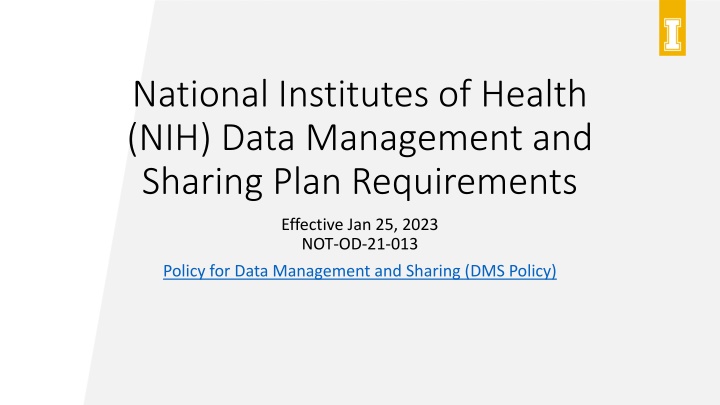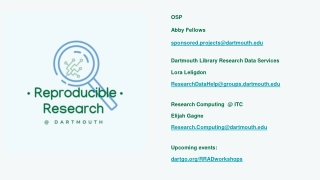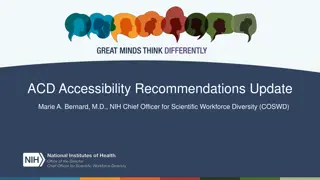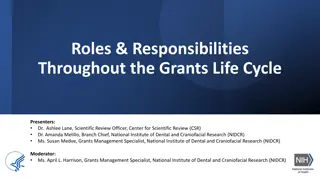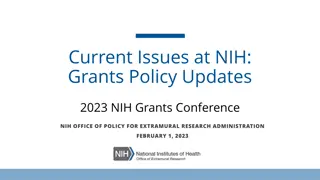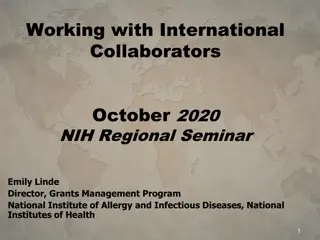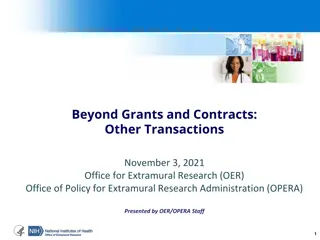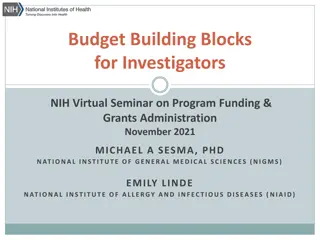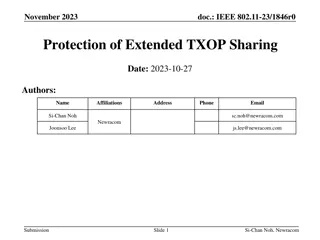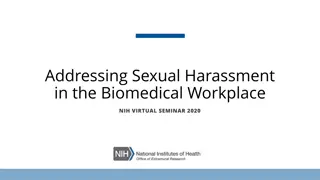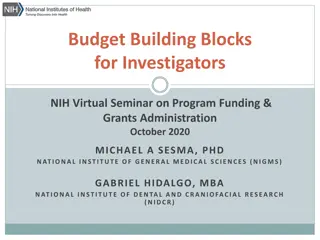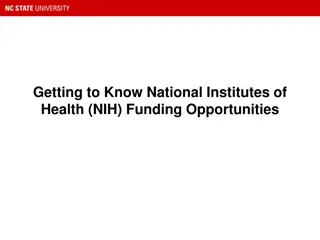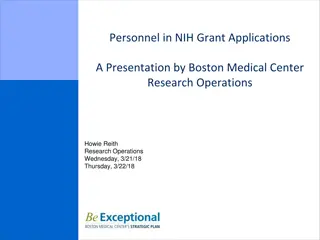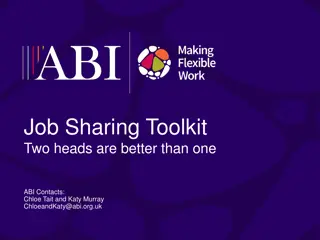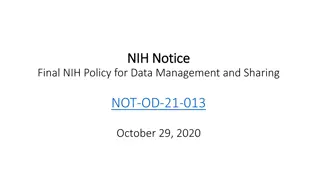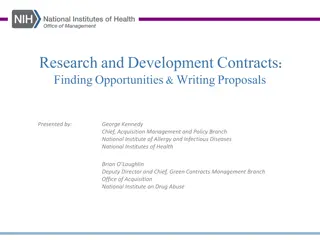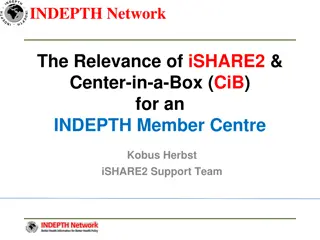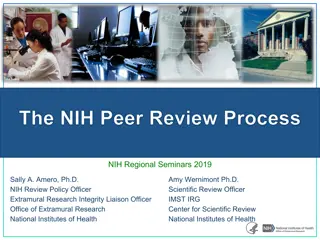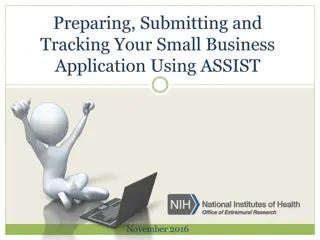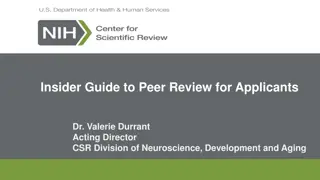NIH Data Management and Sharing Plan Requirements
NIH requires data management and sharing plans for research proposals generating scientific data submitted after 1/25/2023. Plans must detail data management, sharing, and public availability strategies. Updates must be reported to NIH. The plan must include specifics on data type, tools, preservation, access, and oversight. Various resources are available to assist in plan creation and data housing.
Download Presentation

Please find below an Image/Link to download the presentation.
The content on the website is provided AS IS for your information and personal use only. It may not be sold, licensed, or shared on other websites without obtaining consent from the author.If you encounter any issues during the download, it is possible that the publisher has removed the file from their server.
You are allowed to download the files provided on this website for personal or commercial use, subject to the condition that they are used lawfully. All files are the property of their respective owners.
The content on the website is provided AS IS for your information and personal use only. It may not be sold, licensed, or shared on other websites without obtaining consent from the author.
E N D
Presentation Transcript
National Institutes of Health (NIH) Data Management and Sharing Plan Requirements Effective Jan 25, 2023 NOT-OD-21-013 Policy for Data Management and Sharing (DMS Policy)
Requirements All research proposals that result in the generation of scientific data*, submitted to National Institutes of Health (NIH) for deadlines 1/25/2023 or later, require a data management and sharing plan (DMSP) to be included with the proposal. The plan is excluded from peer review. The plan informs how data will be managed and shared throughout the project life (if awarded) and how the data will be made publicly available by the time of the associated publication or project end-date (whichever comes first). Plan updates or changes must be reported to NIH This can be done via the RPPR, Just-in-time, or other mechanisms, NIH will monitor compliance with the plan elements. Data must be shared in an approved repository at the time of publication and/or by the end of the project (term date). Note: Genomic Data Sharing policy is outlined in NOT-OD-22-198. *Scientific Data is defined as data commonly accepted in the scientific community as of sufficient quality to validate and replicate research findings, regardless of whether the data are used to support scholarly publications. Scientific data includes any data needed to validate and replicate research findings. Scientific data does not include laboratory notebooks, preliminary analyses, completed case report forms, drafts of scientific papers, plans for future research, peer reviews, communications with colleagues, or physical objects such as laboratory specimens.
Specifics on policy application https://sharing.nih.gov/data-management-and-sharing- policy/about-data-management-and-sharing-policies/research- covered-under-the-data-management-sharing-policy#after
What elements are required in the plan? Data Type Related Tools, Software, and/or Code Standards Data Preservation, Access, and Associated Timelines Access, Distribution, or Reuse Considerations Oversight of Data Management and Sharing Pro-tips: Do NOT include URLs or hyperlinks (e.g. hypertext) Use DMPTool to create the DMS plan (access via your UI single sign on credentials) The plan has a recommended two page limit. Note: Genomic Data Sharing policy is outlined in NOT-OD-22-198.
What resources are available to help build the plan or house the data? NIH DMSP website This page contains the NIH policy, guidance, and access to FAQs and recorded webinars for these new requirements. University of Idaho Library This page contains helpful information, templates, and a presentation from the UI Library and RCDS team on these new DMSP requirements from NIH. This page also contains a link to the DMPTool which is a free online tool that can assist in generating a compliant plan for these (and other agency) requirements. University of Idaho Research Computing and Data Services (RCDS) This page provides additional information and resources to fulfill the NIH requirement to make the data publicly available by the time of the associated publication or project end-date (whichever comes first).
Selecting a repository The DMS Policy does not currently mandate any particular repository for data, but some individual NIH institutes have specified required repositories. Please note genomic data policy requires specific repository use and an NIH institute could require a specific repository in their guidance or terms and conditions. In general, researchers are encouraged to deposit their data into repositories that support effective data discovery and reuse. The NIH does provide guidance for selecting a repository and provides a list of recommended domain-specific and generalist data repositories. Researchers are expected to discuss their plan for preservation of access to data resulting from the project. https://research.columbia.edu/nih-data-management-and- sharing-plan-2023
Items to think about for budgeting UI investigators should evaluate the provided data repository resources offered by RCDS and the UI Library to see if we have a low or no-cost option to fulfill this requirement. If you are using IIDS/RCDS infrastructure, you must check the institute affiliation box in VERAS. Where are you planning to store data generated? Is there a deposit fee for the repository planned for use in storing and making data generated from the planned project? If yes, does the repository allow pre-payment for the full period or is it an annual re-occurring fee? Note that an annual re-occurring fee outside of the project period is not an allowable cost. Will personnel time need to be attributed to support data management and sharing activities to meet these requirements per project? If yes, these costs should be included in budget line F. Other Direct Costs, Data Management and Sharing. Note if personnel are also senior key personnel, include these costs in their salary/fringe in the personnel section. If no, will you utilize services of the UI library, RCDS, or a vendor? If the project has subrecipients, consider data management and sharing costs and responsibilities attributed to the subawardee and plan for those additional costs when appropriate.
Budgeting for data repository costs Per NIH, investigators may request funds toward data management and sharing in the budget and budget justification sections of their applications. To request costs relating to data management and sharing, the investigator should include the costs as a line item in the budget form AND include a brief summary of the DMS plan and requested cost(s) in the budget justification. These costs must be labeled as data management and sharing costs under budget line item F. Other Direct Costs in the NIH budget R&R form. For NIH modular budget instructions, see the Additional Narrative Justification guidance. Budgeting for Data Management & Sharing | Data Sharing (nih.gov)
Allowable costs: Allowable reasonable costs may include: Curating data Developing supporting documentation Formatting data according to accepted community standards, or for transmission to and storage at a selected repository for long-term preservation and access De-identifying data Preparing metadata to foster discoverability, interpretation, and reuse Local data management considerations, such as unique and specialized information infrastructure necessary to provide local management and preservation (for example, before deposit into an established repository) Preserving and sharing data through established repositories, such as data deposit fees If the Data Management & Sharing (DMS) plan proposes deposition to multiple repositories, costs associated with each proposed repository may be included
Cost allowability continued Costs associated with making data accessible and reusable for other researchers (as outlined on the prior slide) must be incurred in the awarded period of performance, even for scientific data and metadata that are shared beyond the period of performance. Example: If your DMSP proposes costs for housing data in a repository for 10 years, with a deposition fee, the entire fee for the full ten-year period must be incurred (paid) before the project end-date.
Unallowable costs relating to DMS Plans Budget requests must NOT include: Infrastructure costs that are included in institutional overhead (for instance, Facilities and Administrative costs) Costs associated with the routine conduct of research, including costs associated with collecting or gaining access to research data Costs that are double-charged or inconsistently charged as both direct and indirect costs For more information about developing budgets for grant applications, check out the How to Apply Application Guide
Does this policy effect other proposal sections? The Research Strategy section should include how the data will be collected, analyzed, and interpreted. Reference the DMSP as appropriate. The budget justification must include a specific section labeled Data Management and Sharing Justification . Note that for R&R budgets, this is the section that reviewers will have access to (and not the DMSP). R&R budget see prior slides for details Modular budget see prior slides for details
Will my DMS plan affect peer review? Peer reviewers will not have access to the Data Management and Sharing plan, and cannot score based on reasonableness of the budget costs. Note that peer reviewers can comment on reasonableness of the budget request, based on the budget justification summary of the DMS plan. See NOT-OD-22-189 for details.
What happens at Just-in-Time? Processes for Plan Revisions Requested and Just-in-Time Submission Process If the DMS Plan provided in the application cannot be approved based on the information provided, applicants will be notified that additional information is needed. This will occur through the Just-in-Time (JIT) process. Applicants will be expected to communicate with their Program Officer or Grants Management Specialist to resolve any issues that prevent the funding NIH Institute or Center from approving the DMS Plan, and potentially to submit a revised DMS Plan. Refer to NIH Grants Policy Statement Section 2.5.1 Just-in-Time Procedures for additional guidance.
What are my responsibilities during award life and at closeout? The PI is responsible for ensuring data are handled and made available per the approved Data Management and Sharing Plan; This includes coordination of staff and project personnel, Review and monitoring of work progress, Reporting changes and progress via the appropriate mechanisms to NIH, Making the data available via the approved repository(ies) by the date of an associated publication or the project end-date, whichever comes first. OSP is responsible for compliance reviews of the Data Management and Sharing Plan, and review of the RPPR information to identify inconsistencies.
Limitations on Sharing DMS Plans should maximize appropriate sharing Justifiable ethical, legal, and technical factors for limiting sharing include: Informed consent will not permit or limits scope of sharing or use Privacy or safety of research participants would be compromised and available protections insufficient Explicit federal, state, local, or Tribal law, regulation, or policy prohibits disclosure Restrictions imposed by existing or anticipated agreements with other parties
Making data available: When? NIH encourages scientific data to be shared as soon as possible, and no later than at the time of an associated publication or the end of the performance period, whichever comes first. The time of an associated publication: Scientific data underlying peer-reviewed journal articles should be made accessible no later than the date on which the article is first made available in print or electronic format. The end of the performance period: Scientific data underlying findings not disseminated through peer- reviewed journal articles should be shared by the end of the performance period unless the grant enters a no-cost extension. If a no cost extension is permitted, then the recipient should share the data by the end of the extended performance period. These scientific data may underlie unpublished key findings, developments, and conclusions; or findings documented within preprints, conference proceedings, or book chapters. For example, scientific data underlying null and negative findings are important to share even though these key findings are not always published. Researchers should be aware that some preprint servers may require the sharing of data upon preprint posting, and repositories storing data may similarly require public release of data upon preprint posting. NIH Institutes, Centers and Offices (ICOs), Notice of Funding Opportunities (NOFOs), funding opportunity announcements (FOAs), and other NIH policies (e.g., the Genomic Data Sharing Policy) may specify earlier expectations for data sharing timelines, in which case, the data should be made available as required by those expectations. Source: When do I need to make my data available? - Countway LibAnswers (harvard.edu)
What is required in the RPPR (research progress and performance report) and Final RPPR? A new section will be added to the required RPPR Data Management and Sharing with required questions anticipated to be: Have scientific data been generated and shared during this reporting period? Describe activities related to the approved Data Management and Sharing Plan. Enter response below. Are there changes to the Data Management and Sharing Plan? No Change Enter description of change and upload revised Data Management and Sharing Plan If a proposal was not required to include a DMSP at the proposal stage, these questions can be marked as not applicable in the RPPR.
Non-compliance Proposals submitted without a compliant DMS plan can be returned without review by the NIH. Projects that are awarded that are found to be non-compliant with the approved data management and sharing plan can result in NIH enforcement actions including but not limited to: additional restrictive terms and conditions, cancellation of the project and return of funding, restriction for project personnel and the university to future funding opportunities, other enforcement actions as deemed appropriate by NSF and OIG.
What if I have questions? Office of Sponsored Programs: Pre-award team preaward@uidaho.edu (proposals and JIT) Post award team postaward@uidaho.edu (RPPRs and project plan changes) UI Library: Jeremy Kenyon (Research Librarian) jkenyon@uidaho.edu UI RCDS (note this is part of Institute for Interdisciplinary Data Sciences (IIDS)): Dr. Luke Sheneman (Director) sheneman@uidaho.edu Dr. Andrew Child (Environmental Data Manager) awchild@uidaho.edu
